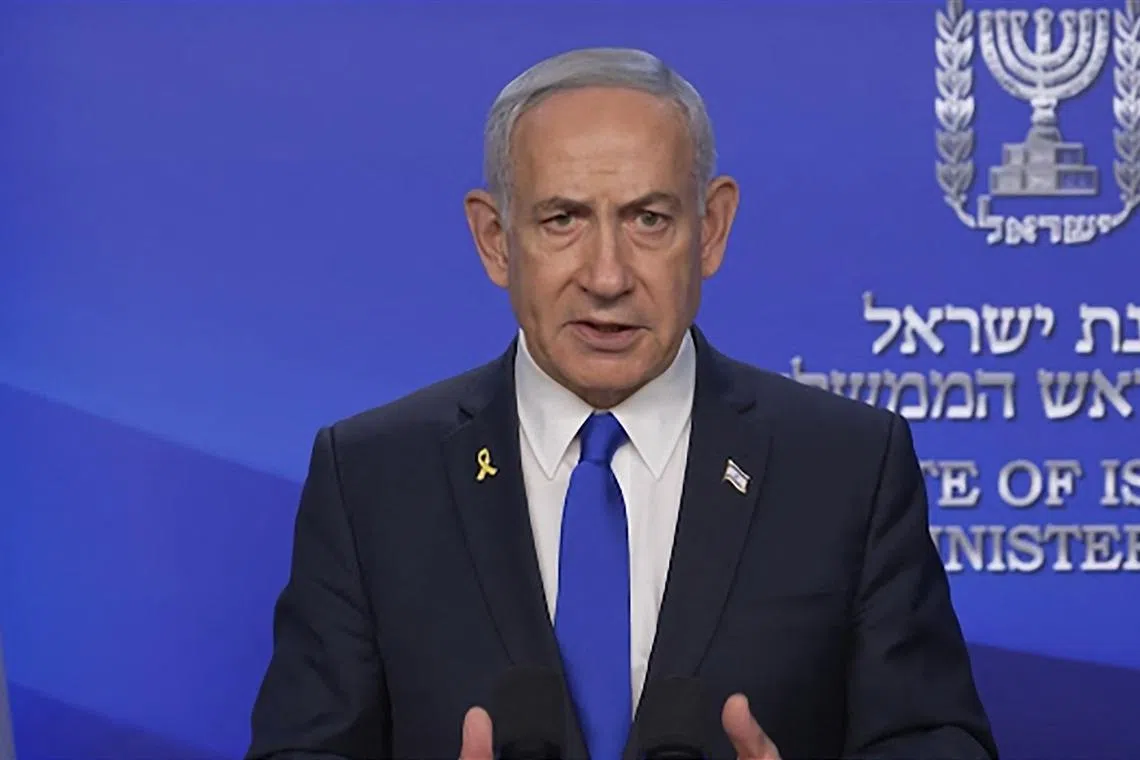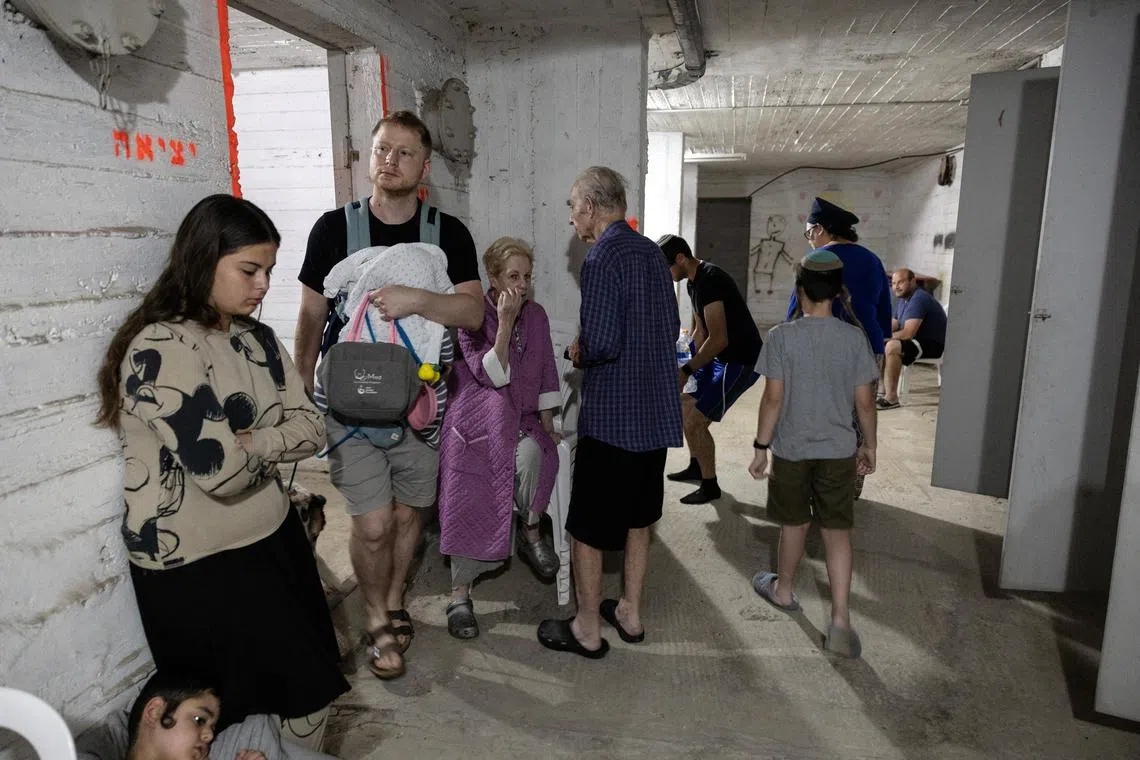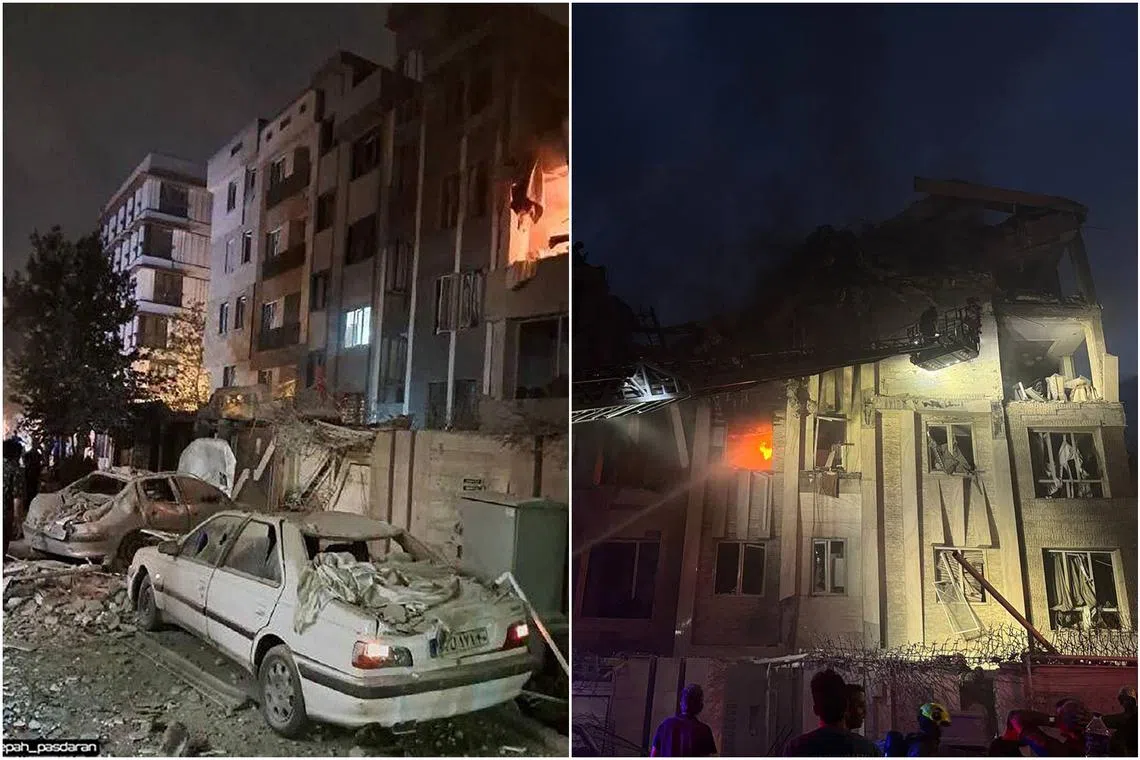Trump tells Iran to ‘make deal’ with Israel as world leaders call for ‘maximum restraint’
Sign up now: Get ST's newsletters delivered to your inbox
JERUSALEM/TEHRAN – Israel launched large-scale strikes against Iran on June 13, saying it targeted nuclear facilities, ballistic missile factories and Iranian security chiefs, and that this was the start of a prolonged operation to prevent Tehran from building a nuclear bomb.
“We are at a decisive moment in Israel’s history,” Israeli Prime Minister Benjamin Netanyahu said in a recorded video message.
“Moments ago, Israel launched Operation Rising Lion, a targeted military operation to roll back the Iranian threat to Israel’s very survival. This operation will continue for as many days as it takes to remove this threat.”
Iran’s Supreme Leader, Ayatollah Ali Khamenei, threatened Israel with “a harsh punishment”.
In a televised message later in the day, Iran’s President Masoud Pezeshkian urged Iranians to stand by their leaders and said a powerful response “will make Israel regret its foolish act”.
Iranian Foreign Minister Abbas Araghchi in a letter to the United Nations described Israel’s attack as a “declaration of war” and “called on the (UN) Security Council to immediately address this issue”.
The Israeli military announced that Iranian forces fired about 100 drones at Israel in response to the strikes.
But by 8am GMT, Israeli media said an order to Israelis to remain near protected areas had been lifted, suggesting most or all of the drones had been neutralised.
The wide-ranging Israeli attack has prompted fears that long-simmering tensions between the heavily armed rivals were spiralling into a full-blown regional war.
US President Donald Trump weighed in, describing the Israeli strikes as “excellent” and calling Iran to “make a (nuclear) deal before nothing is left”.
“We gave them a chance, and they didn’t take it. They got hit about as hard as you’re going to get hit, and there’s more to come, a lot more,” Mr Trump said in a recorded interview with an ABC News reporter.
In a post on Truth Social, he said that “the next already planned attacks” could be “even more brutal”.
World leaders, meanwhile, called on both sides to de-escalate and exercise maximum restraint.
Surprising scale
Mr Netanyahu had threatened an attack on Iran’s nuclear programme for years, but the scale of the strikes overnight stunned Iranians and Israelis alike.
More than 200 Israeli fighter jets took part in the attack, which targeted over 100 sites, including a major Iranian nuclear enrichment centre in Natanz.
The International Atomic Energy Agency said there was no increase in radiation levels in Natanz, citing information given to it by the Iranian authorities.
At least two Iranian nuclear scientists
The strikes were also a major blow to Iran’s military chain of command.
Major-General Mohammad Bagheri, commander-in-chief of the Iranian military and the second-highest commander after Ayatollah Khamenei, was killed, according to the Israeli military and Iranian media.
Iran’s elite Islamic Revolutionary Guard Corps said its head, Major-General Hossein Salami, was also killed and its headquarters in Tehran hit.
Israel’s military spokesman, Brigadier-General Effie Defrin, said Major-General Gholam Ali Rashid, commander of Iran’s Emergency Command, was likewise killed in the surprise attack.
Israeli Defence Minister Israel Katz said the “precise targeting of senior commanders sends a strong and clear message – those who work towards Israel’s destruction will be eliminated”.
Targets hit in Iran
Israel also struck residential buildings in densely populated neighbourhoods of Tehran, according to witnesses, videos, photos and Iranian state media.
Iran’s Nournews said 78 people were killed and 329 injured in the attack.
Residents of Tehran reported hearing huge explosions, and Iranian state television broadcast images of fire and smoke billowing from buildings.
They rushed into the streets, many saying they were startled awake by the sounds of explosions. State television broadcasts showed damaged apartment buildings, with debris scattered in the streets.
In the Iranian cities of Isfahan, Arak and Kermanshah, which house military and industrial complexes, explosions were also reported.
Mr Mohammad Jamali, who was standing on a roof in Tehran, said he could see two Israeli jets attacking an airbase of the Revolutionary Guards.
“What I can see are two massive flames and smoke coming from two military bases in eastern Tehran,” he said.
Israel’s military chief of staff, Lieutenant-General Eyal Zamir, said tens of thousands of soldiers have been called up and “prepared across all borders”.
“We are amid a historic campaign unlike any other. This is a critical operation to prevent an existential threat, by an enemy who is intent on destroying us,” he said.
The Israeli Foreign Ministry said the country had decided to temporarily close all its diplomatic missions. Consular services would not be available for Israeli citizens overseas, it said.
It also warned Israelis abroad not to display national symbols in public or post identifiable information and travel plans online, and to avoid attending large, Israel-related events.

PHOTO: AFP
World reacts
A spokesman for Singapore’s Ministry of Foreign Affairs said in a statement
“We urge all parties to exercise restraint and to de-escalate,” he said.
UN Secretary-General Antonio Guterres asked Israel and Iran “to show maximum restraint, avoiding at all costs a descent into deeper conflict, a situation that the region can hardly afford”, a spokesman said.
The leaders of Britain, Germany and France also asked the two warring sides to stand down and return to diplomacy.
Nato Secretary-General Mark Rutte said: “This was a unilateral action by Israel. So I think it is crucial for many allies, including the United States, to work as we speak to de-escalate.”
Mr Netanyahu was expected to speak to Mr Trump and Russian President Vladimir Putin later on June 13. His office said he had already talked to the leaders of Germany, India and France.
US officials have repeatedly said any new nuclear deal with Iran – to replace a failed 2015 accord between Tehran and six world powers – must include a commitment to scrap enrichment, viewed as a potential pathway to developing nuclear bombs.
Iran has repeatedly denied such intentions, saying it wants nuclear energy only for civilian purposes, and has publicly rejected Washington’s demand to scrap enrichment as an attack on its national sovereignty.

Israelis gather in a shelter following sirens in Tel Aviv, Israel, on June 13.
PHOTO: REUTERS
US Secretary of State Marco Rubio said Israel acted unilaterally because it believes the operation was necessary for self-defence.
“Tonight, Israel took unilateral action against Iran. We are not involved in strikes against Iran and our top priority is protecting American forces in the region,” he said in a statement.
“Let me be clear: Iran should not target US interests or personnel,” he added.

Iran’s state TV said several explosions were heard in Tehran and the country’s air defence system was on full alert.
PHOTOS: SEPAH NEWS/AFP
Airlines cleared out of the airspace
FlightRadar24 data showed airspace over Iran, Iraq and Jordan was empty, with flights directed towards Saudi Arabia and Egypt instead.
About 1,800 flights to and from Europe had been affected as at midday on June 13, including approximately 650 cancelled flights, according to Eurocontrol.
The attacks triggered sharp falls in stock prices in early Asian trade on June 13, led by a sell-off in US futures, while oil prices jumped


